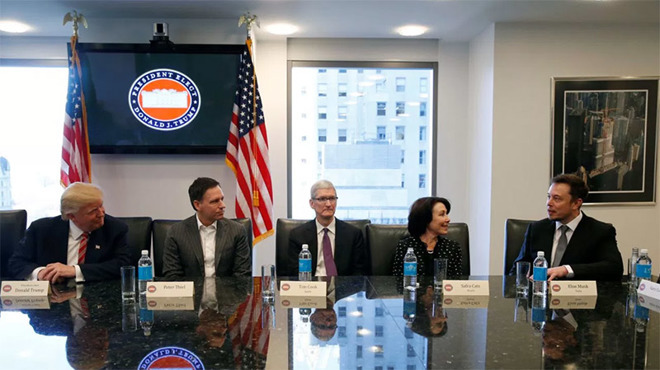In a response to employee questions posted to Apple's internal message board, Apple CEO Tim Cook on Monday explained why he felt it necessary to attend President-elect Donald Trump's tech summit earlier this month.
According to an Apple Web conversation obtained by TechCrunch, an employee asked Cook to explain the importance of Apple's presence at last week's meeting.
Specifically, the unnamed employee asked, "Last week you joined other tech leaders to meet President-elect Donald Trump. How important is it for Apple to engage with governments?"
In response, Cook expounded on the benefits of active discourse between policymakers and tech leadership, suggesting the two camps have a symbiotic relationship or sorts.
"Governments can affect our ability to do what we do. They can affect it in positive ways and they can affect in not so positive ways. What we do is focus on the policies," Cook said. "Some of our key areas of focus are on privacy and security, education. They're on advocating for human rights for everyone, and expanding the definition of human rights. They're on the environment and really combating climate change, something we do by running our business on 100 percent renewable energy."
Cook's commentary appears to be an allusion to Trump's various stances — at least those taken during his Presidential campaign — on touchstone issues, from immigration to privacy, each of which being diametrically opposed to Apple's own viewpoint. That Trump so vociferously attacked Silicon Valley sentiment on the campaign trail prompted some to question why executives like Cook agreed to meet with Trump in the first place.
For Apple, Trump's tech summit represented an opportunity to start a dialogue on a number of fronts, including hot button social issues and policy decisions that directly impact the company's domestic and international operations. Beyond human rights and environmental advocacy, Cook referenced pending tax reform, job creation and the specter of intellectual property lawsuits.
"There's a large number of those issues, and the way that you advance them is to engage. Personally, I've never found being on the sideline a successful place to be," Cook said. "The way that you influence these issues is to be in the arena."
Trump invited a who's who of tech executives to take part in a high-profile summit last week, with those in attendance including Cook, who sat only two seats away from the President-elect, Alphabet's Larry Page and Eric Schmidt, Amazon's Jeff Bezos, Facebook's Sheryl Sandberg, Microsoft's Satya Nadella, IBM's Ginni Rometty, and Tesla's Elon Musk. Cook also took part in a private meeting with Trump behind closed doors, the proceedings of which are as yet unknown.
Cook's response in full:
It's very important. Governments can affect our ability to do what we do. They can affect it in positive ways and they can affect in not so positive ways. What we do is focus on the policies. Some of our key areas of focus are on privacy and security, education. They're on advocating for human rights for everyone, and expanding the definition of human rights. They're on the environment and really combating climate change, something we do by running our business on 100 percent renewable energy.And of course, creating jobs is a key part of what we do by giving people opportunity not only with people that work directly for Apple, but the large number of people that are in our ecosystem. We're really proud that we've created 2 million jobs, just in this country. A great percentage of those are app developers. This gives everyone the power to sell their work to the world, which is an unbelievable invention in and of itself.
We have other things that are more business-centric — like tax reform — and something we've long advocated for: a simple system. And we'd like intellectual property reform to try to stop the people suing when they don't do anything as a company.
There's a large number of those issues, and the way that you advance them is to engage. Personally, I've never found being on the sideline a successful place to be. The way that you influence these issues is to be in the arena. So whether it's in this country, or the European Union, or in China or South America, we engage. And we engage when we agree and we engage when we disagree. I think it's very important to do that because you don't change things by just yelling. You change things by showing everyone why your way is the best. In many ways, it's a debate of ideas.
We very much stand up for what we believe in. We think that's a key part of what Apple is about. And we'll continue to do so.
 Mikey Campbell
Mikey Campbell







-m.jpg)






 Charles Martin
Charles Martin
 Marko Zivkovic
Marko Zivkovic
 Andrew Orr
Andrew Orr
 Amber Neely
Amber Neely

 William Gallagher and Mike Wuerthele
William Gallagher and Mike Wuerthele











28 Comments
And Steve Jobs attended Obamas meeting with all the tech companies. No explanation necessary.
At least Tim Cook acted like an adult instead of throwing tantrums. Trump was elected, so he must deal with it, he has to anyway. I call this, act with integrity.